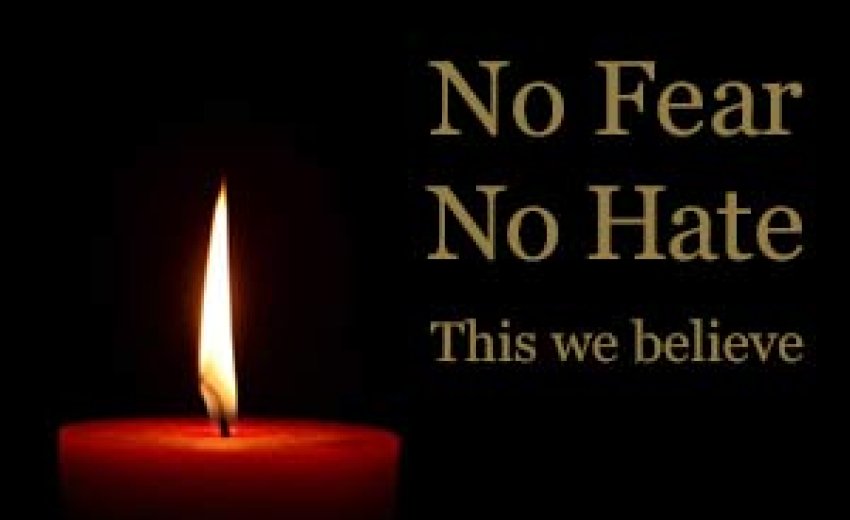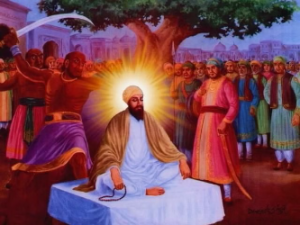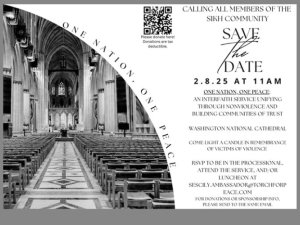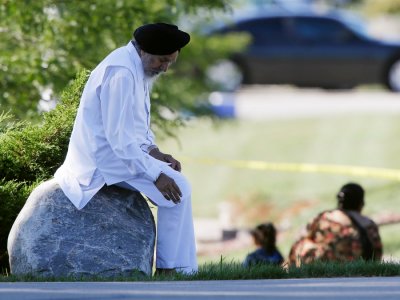 One moment. One touch. One person. It can bring light to the world. It can bring the deepest darkness. On August 5, 2012, a year ago, the Oak Creek Gurdwara in Oak Creek, Wisconsin, experienced the worst and the best of humanity.
One moment. One touch. One person. It can bring light to the world. It can bring the deepest darkness. On August 5, 2012, a year ago, the Oak Creek Gurdwara in Oak Creek, Wisconsin, experienced the worst and the best of humanity.
The worst:
Wade Page, a Neo Nazi and army veteran, deliberately opened fire on a group of Sikhs at their place of worship. In a premeditated act of hate, he killed six defenseless people engaged in prayer because of how they looked - because of their beards, their turbans and their dark skin. Page associated that image with something so terrible, that his twisted mind could justify the cold-blooded murder of innocent people.
The best:
Oak Creek Police Officer Lt. Brian Murphy and Satwant Singh Kaleka
Lt. Murphy arrived on the scene at the Oak Creek Gurdwara first. He drew Page’s fire, and took 12 bullets from the deranged Page. There is no calculating how many innocent lives Lt. Murphy saved that day. By keeping the shooter’s attention on him, Murphy and his fellow officers prevented the tragedy from escalating.
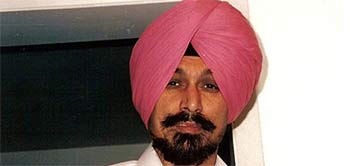 Satwant Singh took on a fully armed Wade Page with a small ceremonial dagger and paid with his life while protecting children and women in the Gurdwara.
Satwant Singh took on a fully armed Wade Page with a small ceremonial dagger and paid with his life while protecting children and women in the Gurdwara.
When we remember Oak Creek, we remember both sides of this spectrum. The terror and the heroism. The grief and the gratitude. The shock and the resilience.
Meditating this week on the Oak Creek Gurdwara shootings, the lessons for us are lessons about the heart.
While we won’t ever know why the gunman did what he did, it is natural to keep asking "Why." Why would Wade Michael Page do something like this? Surely, he must have known that he would die in the process. He had military training. He knew the police would show up. Something in his heart had gone so dark that he chose to murder innocent people. Innocent people that he somehow blamed. Innocent people that he had never met, or spoken with, or tried to understand. He chose to shoot them simply because of how they looked and what that image meant to him. This is a common misconception. We Sikhs wear turbans and seem to have been mistaken for the Taliban - extremists full of intolerance and hate.
It is the tragedy of how the human heart works. When we feel pain, we want to get rid of it by blaming others, hating others or attacking others. In those moments, an invisible poison gets transmitted from one heart to another. The darkness and the despair spreads. As Yoda said, "Fear breeds anger. Anger leads to hate. Hate creates suffering." One man with one gun, tries to exorcise his inner demons. All of the sudden, hell manifests and is visible. Some people die. Some people are wounded. And every single person there, every single person who hears about it, has to live with the poison. One heart, clouded by ignorance and misunderstanding, leaves a legacy of loss and sorrow.
The battle for peace is ultimately won or lost in the human heart. When that poison comes to you from another person – what do you do with it? How do you handle it?
 Lt. Brian Murphy gives another example. He fought back. He stopped the poison from spreading. He willingly gave his body, drawing as much of that poison into him as possible with every bullet. To this day, Lt. Murphy is still recovering from his wounds. But his heart and spirit were never wounded. In that critical moment, his heart was filled with a desire to protect others. And that desire to protect bestowed a profound protection on himself. A protection from the despair and the darkness. The true definition of a warrior and hero's courage.
Lt. Brian Murphy gives another example. He fought back. He stopped the poison from spreading. He willingly gave his body, drawing as much of that poison into him as possible with every bullet. To this day, Lt. Murphy is still recovering from his wounds. But his heart and spirit were never wounded. In that critical moment, his heart was filled with a desire to protect others. And that desire to protect bestowed a profound protection on himself. A protection from the despair and the darkness. The true definition of a warrior and hero's courage.
The response of the Sikh community, both within Oak Creek and around the world, gives us another example. Guru Nanak, our first Guru, in our first prayer, the Mool Mantra, teaches: Nirbhao and Nirvair. No fear. No vengeance. It is a supreme act to conquer one’s inner fear. To conquer one’s rage. That is what the Sikh community did. No fear. But, it is even a greater act to restrain one's anger and not to hate back. Sikhs all over came together and supported one another in our grief. The community reclaimed the Gurdwara and made it, once again, a place of prayer, service and unity. In dignity, Oak Creek, Wisconsin, the nation and the world came together in this healing. The Sikhs felt the poison, but did not let it conquer them. The collective prayers and support that surrounded us helped us through this difficult time.
Sikhs have always been resilient and live in an ever-rising spirit. This is Chardi Kala, our ability to tap into our inner Light, our fundamental Love, no matter what poison we have to face. In times of crisis, we have always come together as families, communities and as a global society.
Throughout Sikh history, the Gurus never fought to conquer physical territory. They stood up against injustice and tyranny and fought the battle for the human heart. Once our teacher, the Siri Singh Sahib, Yogi Bhajan, was asked, “What does it mean to fight?” And he said, “Fight with kindness.” Then he was asked, “What is there to win?” He replied, “Win the goodwill.” This is the spirit of the spiritual warrior forged in the heat of battle during the time of Guru Gobind Singh. Fight with kindness. Win the goodwill. Then the battle can be won every time.
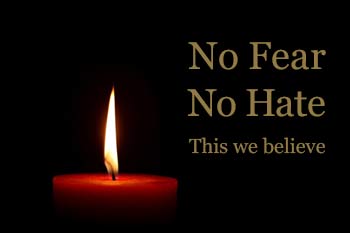 Chardi Kala seems to me to be the ability to not absorb and embody the pain that another person tries to inject into you. It means blame, hatred and attacks cannot get all the way inside. The heart maintains a core connection with an Infinite and Loving Divine Consciousness that gives us the antidote to the poison. Does this mean we do not feel pain? Of course, we do. It just means the Spirit can beat the pain. It means forgiveness that allows one to move forward.
Chardi Kala seems to me to be the ability to not absorb and embody the pain that another person tries to inject into you. It means blame, hatred and attacks cannot get all the way inside. The heart maintains a core connection with an Infinite and Loving Divine Consciousness that gives us the antidote to the poison. Does this mean we do not feel pain? Of course, we do. It just means the Spirit can beat the pain. It means forgiveness that allows one to move forward.
An irony of history is that the true power of our Chardi Kala become most apparent in the most dire of situations. Like steel forged from extreme heat and pressure, this consciousness becomes most visible when the external situation is beyond reason. It is a testament to the faith of the Sikh people that the spirit of Chardi Kala flowered again after the Oak Creek Gurdwara attack. This is what we celebrate, honor and remember on this first anniversary. It has been over 300 years since the Khalsa formed. Yet, this ability to turn tragedy into a victory of the heart lives on.
Next week, next month – we will continue with our busy lives, caught up in the immediate pressures of our daily routines. But today, for this anniversary, we bow our heads in thanks and gratitude, and recognize that the Light of the Spirit fought back against the darkness and despair. And won.
In Chardi Kala,
Ek Ong Kaar Kaur Khalsa & Supreet Singh Manchanda,
SikhNet
In Rememberance
Satwant Singh Kaleka
Paramjit Kaur
Prakash Singh
Ranjit Singh
Sita Singh
Suveg Singh
In Recognition
Lt. Brian Murphy
Punjab Singh
Santokh Singh
